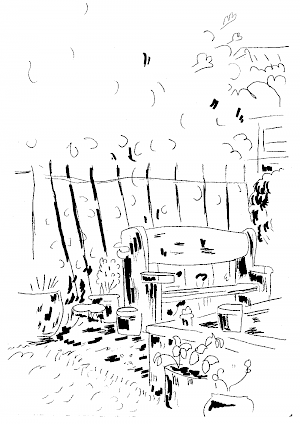


There's an interest in larger forces that shape his days. There's a lot of text used once again, as he thinks about places he's lived and the visceral qualities of each: sights, sounds, smells, heat, cold, etc. The final issue, #10, touches on a number of these themes. Finally, there is quiet reconciliation and more contemplative walks, the event of music suddenly breaking out on the street the kind of marvel that reminds us of the random gifts that life can bring. There's a remarkable segment where he's alone in a bar, where the pages flip open and fold apart, as he feels powerless to stop what's going on in his life, like a "drunken ghost". In classic Warren Craghead fashion, when he talks about the pieces of the relationship being taken apart, the very text that proclaims this falls apart, drifting down the page. The vignettes refer to a relationship that's in the process of being redefined and reevaluated on the fly, in the middle of what is ostensibly a vacation. Reading Moreton's work over time, he's become remarkably assured in his minimalist take, as he's not afraid to draw big, bold strokes or use a few strategically placed and confident squiggles around a simply-defined central figure. Walking around Washington, DC in the fall, the sight of a snapping turtle on a rock was somehow reassuring. Issue #8, in several small vignettes, talks about different ways Moreton felt the weight of anxiety and stress, and the ways in which he found himself coping.


 0 kommentar(er)
0 kommentar(er)
